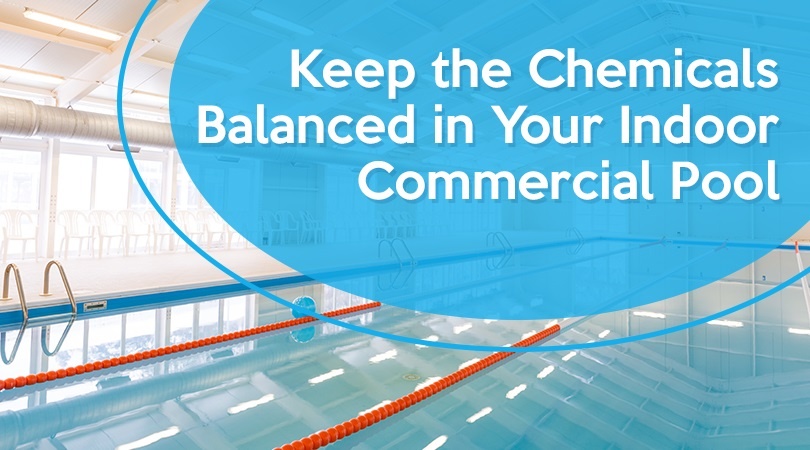
Commercial pools at hotels, resorts, health clubs and even public parks are used by many people year-round. A heated indoor pool is always welcome in cool weather. Keeping the recommended pH balance for acidity and alkaline levels at 7.4 to 7.6 requires continual monitoring with daily pool use.
Indoor pools react differently to evaporation based on the size of the pool and the indoor facility. Chemicals, especially chlorine, evaporate in outdoor pools and spa tubs. The evaporation may be less with an indoor facility even though the pool and spa tub are heated.
Florida has specific requirements for all commercial pools. Measure the amounts of chlorine and other chemicals in a pool or spa tub in parts per million or ppm. Take a sample of the water to complete this measurement with a water test monitor.
The preferred level of chlorine or bromine is 2-3 ppm for commercial swimming pools and 3-5 ppm for hot tub spas. One gallon jug of chlorine added to a pool with 1000 gallons of water will raise the acid level by 1 ppm. An inground pool 44 feet long and 24 feet wide with an average depth of five feet will hold about 39,600 gallons of water.
The alkaline level should be 80-120 ppm. Calcium hardness is in the 200-400 ppm range. Total dissolved solids in the swimming pool should be 1000-2000 ppm.
Cyanuric acid, a chlorine stabilizer, should measure 30-40 ppm in pools and 0-20 ppm in spa tubs. Less stabilizer may be needed for indoor pools than outdoor pools since there is typically less evaporation.
Check the chlorine level daily, but you can check calcium and alkalinity levels weekly. Enter this information into a log, including the time and date of each check.
Commercial and residential pools usually have chlorine added in the evenings when the pool is not in use. Resort pools usually have a sign indicating when maintenance has closed the pool and hot tubs. You should not allow pool usage while the added chlorine is circulating through the system.
The odor associated with pools is actually from the chlorine mixed with bacteria, oil, sweat and other waste the chemicals are supposed to eliminate. This is a chloramine odor from the chemical compounds that build up if the pool does not have the proper pH balance. This odor can permeate the air in rooms with indoor swimming pools and tubs if there is not enough chlorine in the water. It may be less noticeable in outdoor pools.
A leak in any swimming pool, especially a commercial pool, will upset the pH balance. A leak may result in a strong odor in an indoor pool facility as the water level drops. Maintenance personnel at a resort with an indoor pool must check the fittings around the pool on a daily basis. A loose ladder can cause a leak.
Commercial pools and spa tubs may need some water added daily if the pool is in constant use. There is always splashing, especially if the pool has a diving board or slide. Check the pH balance each time after you bring the pool to your desired water level.
An unusually low water level may indicate a leak that must be repaired immediately to keep the pool in operating condition. Aquaman Leak Detection is available for all indoor and outdoor commercial swimming pool and spa tub repairs with fast service throughout Florida. Contact Aquaman Leak Detection for fast service and leak repair to minimize pool closures due to leaks.

With over 20 years of reputable experience finding leaks, owner Lowell Ball created a unique and patented leak detection system that accurately finds leaks without damaging property. We are so confident in our system and our workmanship, we offer the strongest warranty in the industry.
Aquaman Leak Detection Corporate
1275 South Patrick Dr, Suite A6
Satellite Beach, FL 32937
Owner Direct: 321.431.4784
844.766.5532 (844 POOL LEAK)
info@aquamanleakdetection.com
Office Hours:
9AM-6PM Mon-Fri
Emergency Service Available 24/7
Blog Comments